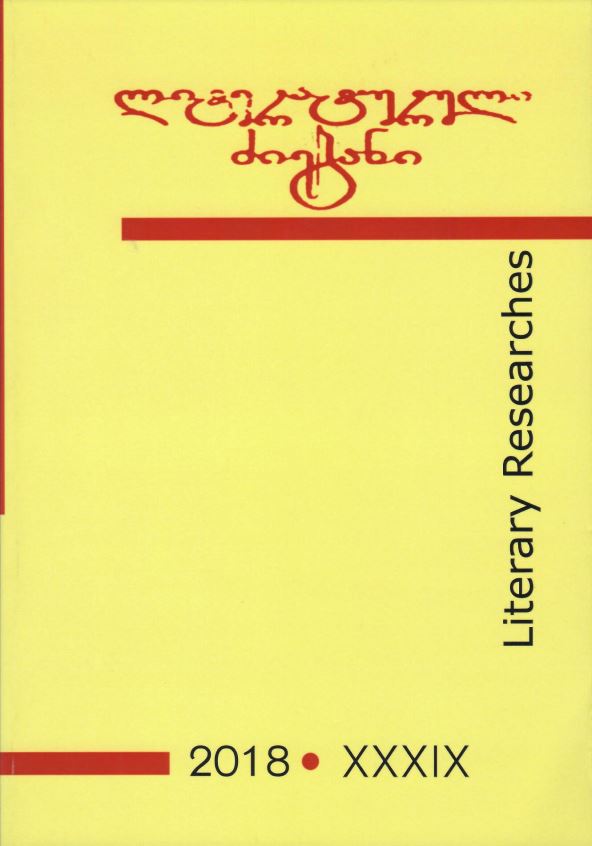Published 2018-12-20
Keywords
- Vakhushti Kotetishvili,
- Rubai,
- Sonnet,
- Versification
How to Cite
Abstract
It is impossible to imagine the cultural and social life of Georgia in the second half of the XX century without Vakhushti Kotetishvili’s colorful figure. He passed away 10 years ago and took with him that mystic halo, which was due to the blend of unlimited popularity gained by his own activities with his tragic biography. Luckily, the portrait of a scholar, well-known translator, Iranologist and public figure was reflected in his poetry too. It can be stated that the collection of Vakhushti Kotetishvili’s translations of masterpieces of World Poetry “East Western Divan” published by “Diogene” in 2003 – will remain a book of the century in the history of Georgian culture. It includes poetic works translated by Vakhushti Kotetishvili in 1955-2000: the masterpieces of Persian poetry (Rudaki, Ferdowsi, Abu Said, Ansari, Omar Khayyam, Sanaayi, Nizami Ganjeli, Masud Sad Salman, Jelal al-Din Rumi, Saadi, Hafez, Abd ar-Rahman Jami) and European poetry: Rainer Maria Rilke’s selected poems “Duine Elegies” and the Sonnets to Orpheus, twentieth-century Russian poetry (Innokentiy Annensky, Maximilian Voloshin, Nikolay Gumiliov, Osip Mandelshtam, Marina Tsvetaeva, Josef Brodsky). In the foreword of this book Vakhushti Kotetishvili noted: “The original has no age, does not “become old” whereas the translation often becomes outdated and therefore, a new epoch requires more and more new translations of brilliant creations. This does not apply only to congenial translations which firmly establish a place in the depths of the original literature. For example, it is enough to mention Georgian translation of “Visramiani” and Machabeli’s Shakespeare” (Kotetishvili 2003: 12). The poems translated by Vakhushti Kotetishvili will undoubtedly endure time and they will not have a lack of reader…
Vakhushti Kotetishvili’s word sonorous and with recognizable burr in his voice seemed to be demanding to leave a loud, bright mark with his original verses too: it was impossible to
completely separate the transient and eternal; an example of this is his “Sonnets” published as a collection of works by “The Union of Writers of Georgia” in 2015.
First Vakhushti Kotetishvili drew attention to European and Oriental fixed verse forms in 1959, when he considered a collection “Oriental Poetry” translated by Magali Todua. The young scholar pointed out that at the end of the 18th century and beginning of the 19th century “the verse forms of the oriental lyric genre penetrated into Georgia: mustazadi, mukhambazi, etc., that are found in sufficient quantity in the works of Sayat-Nova, Besiki, Al. Chavchavadze, G. Orbeliani, but these verse forms failed to get established on Georgian soil in the same way as sonnet, triolet, terza rima and others”(Kotetishvili 1959: 4). The reviewer-researcher explains the essence and reasons of this phenomenon: “... Georgian verse has never had any restrictions and cannot reconcile with any norms other than the minimum”.
This poetic confession of Vakhushti Kotetishvili concerning the verse forms rendered by a
sonnet in 2007 and the above-mentioned statement made in 1959 by Vakushti Kotetishvili as
a scholar, Orientalist, researcher into rhyme seems to be the thesis and antithesis of each other, the contradiction is a proof: the author is extremely individual and sincere and at the same time, introduces us to universally known truth referring to the viewpoint of a modern immigrant poet and theoretician V. S Naipaul: “Literary forms are necessary: the experience must be transmitted in a generally accepted or perceived form; but sometimes the form is perceived as unacceptable or something superfluous ... Every serious writer considers the issue of form, because no matter how much he appreciates previous writers, he should take into account that the forms used by these writers correspond to their experience and not his own experience”.
Vakhushti Kotetishvili, at that time just a novice poet, – as if allegorically associates the proper name of the eastern woman Rubai with the eastern form of the verse rubai // rubaiyat. It is noteworthy that the rhyme scheme of rubai is found in the poem Makhla written by the young Vakhushti in 1953.
Vakhushti Kotetishvili the poet takes special interest in the verse form mrchobledi, which,
according to the couplets written by Kotetishvili in 1990, is original, at least because it is rhythmless.
As we have said, Vakhushti Kotetishvili’s search to bring into light the pearls from the depths
of Georgian verse was publicly announced almost four decades ago. The supporter of Georgian folk poetry he himself appeared a good poet and narrator (Vakhushti Kotetishvili’s dazzling kafias and their shairi are widely known, “Kafiaoba in Lekso Chincharauli”), but did not hurry to bring his works to the reader...

